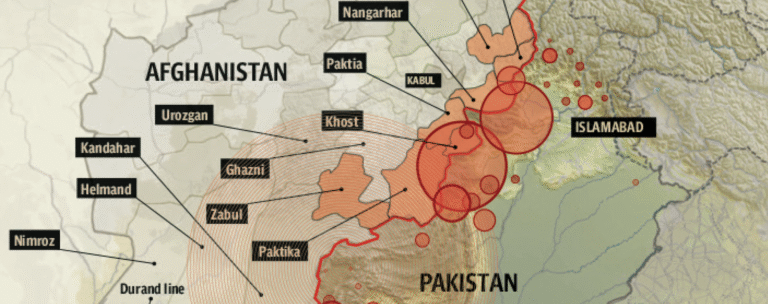PUBLISHED
October 19, 2025
KARACHI:
Along Pakistan’s porous western border, long-simmering tensions have boiled over after reported precision counterterrorism strikes inside Afghanistan. The Taliban regime reacted with reckless aggression. While Afghan border guards have launched unprovoked attacks in the past too, this time the scale was unprecedented, with coordinated assaults on Pakistani border posts across North Waziristan, Kurram, Chaman, and Zhob. Pakistan responded with measured reprisals, neutralising multiple hostile elements while limiting collateral damage. The timing of this latest escalation, however, adds a new layer of concern. The hostilities coincided with the Taliban regime’s foreign minister, Mullah Amir Muttaqi, visiting India — Pakistan’s arch-rival, with whom tensions had recently escalated into a military confrontation.
Since the Taliban’s capture of Kabul, cross-border attacks by the banned Tehreek-e-Taliban Pakistan (TTP) and Hafiz Gul Bahadur (HGB) groups — officially designated as ‘Fitna al Khawarij’ — have increased dramatically. And this is not a mere accusation; hard data confirms this surge. According to the statistics compiled by security officials, the TTP now operates more than 60 camps across Afghanistan’s Nuristan, Kunar, Nangarhar, Paktiya, Khost, and Paktika provinces.
Cross-border infiltrations have surged 36% since June 2025. Nearly 4,000 terrorists entered Khyber-Pakhtunkhwa from Afghanistan, and another 1,200 crossed into Balochistan from Zabul, Paktika, Kandahar, and Helmand provinces. The UN’s Analytical Support and Sanctions Monitoring Team has endorsed these findings, confirming that Afghan soil continues to serve as a launchpad for terrorism — a clear violation of the 2020 Doha Agreement, in which the Taliban pledged not to allow Afghan territory to be used by transnational terrorists.
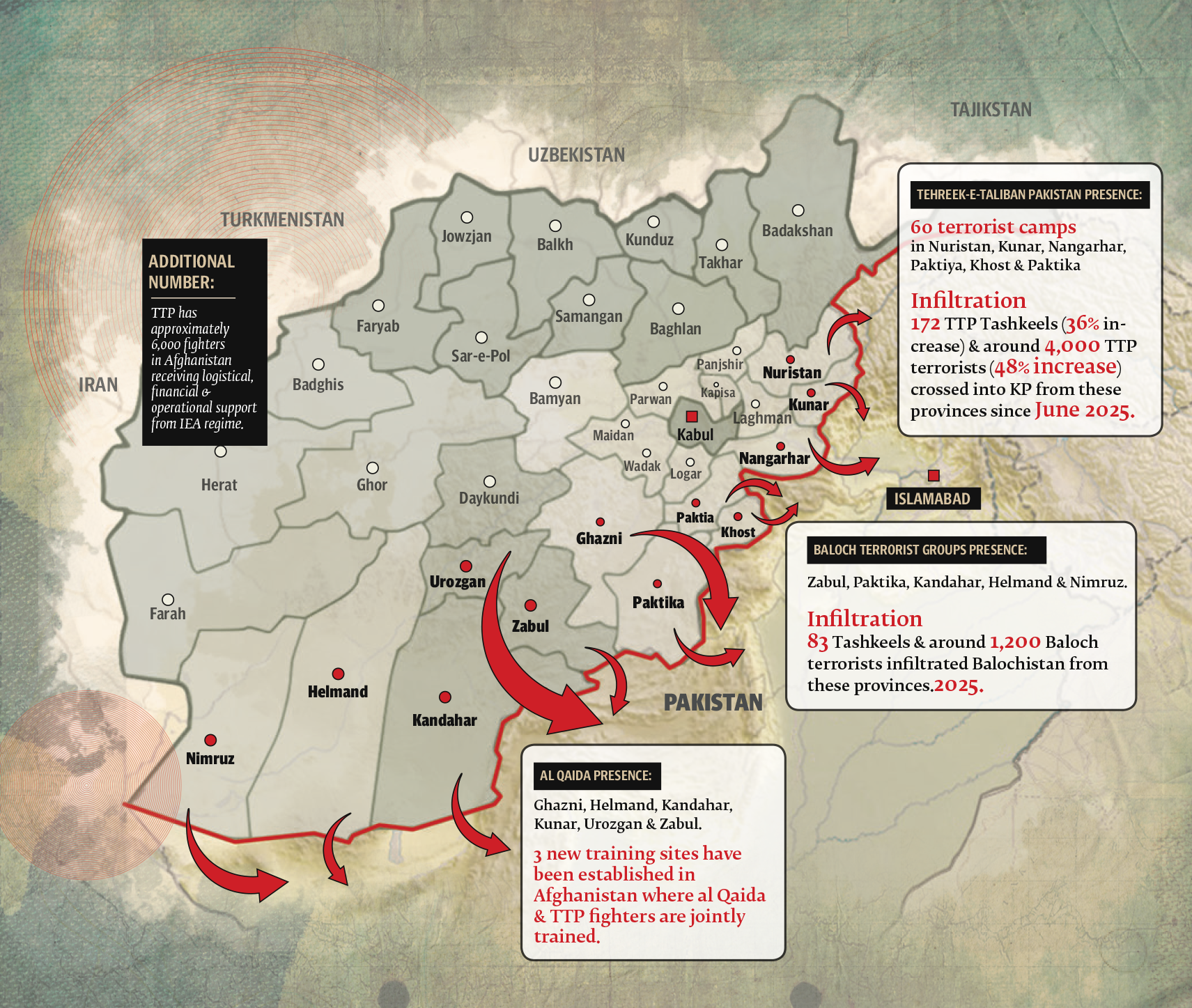
The Denial Game
Intelligence sources claim TTP chief Noor Wali Mehsud lives in Kabul under the protection of the Taliban regime, allegedly receiving an estimated $43,000 per month in funding. Meanwhile, terrorists from TTP and banned Balochistan Liberation Army (BLA) have gained access to advanced weaponry — part of the $7 billion stockpile left behind by US and NATO forces in Afghanistan. Mounting evidence points to the Afghan Taliban’s permissive — and in some cases facilitative — stance towards TTP activities.
Alarmingly, Afghan nationals are increasingly joining TTP ranks. Three out of six terrorists who carried out the September 2 attack on the Federal Constabulary headquarters in Bannu turned out to be Afghans. Intelligence sources further reveal that over 207 Afghan citizens have been killed in counterterrorism operations across Pakistan. In a more troubling development, the Taliban regime has also activated proxy groups like “Tahaffuz-e-Emarat-e-Islami Force”, which claimed responsibility for the October 11 deadly assault on the Police Training School in DI Khan.
These revelations reinforce growing concerns about Afghanistan’s continued role as a sanctuary for terrorism targeting Pakistan. Islamabad has repeatedly urged the Taliban regime to rein in these groups, but Kabul maintains “plausible deniability” about their presence on Afghan soil — a stance increasingly untenable given the facts on the ground. Dozens of TTP operatives, including former leaders Mullah Fazlullah and Omar Khalid Khorasani, have been killed inside Afghanistan, exposing the contradictions in Kabul’s denials.
Ironically, the Taliban have instead blamed Pakistan for harbouring Islamic State Khorasan Province (ISK-P) in Balochistan with the regime chief spokesperson, Zabihullah Mujahid, asking Islamabad at a recent news briefing to hand over key terrorists from the group — a claim widely seen as an attempt to shift the narrative.
Notwithstanding the Taliban’s reluctance to act against the TTP/BLA, Pakistan has shown restraint, opting for political and diplomatic engagement instead. Several initiatives have been undertaken since 2022, including peace missions led by religious scholars such as Mufti Taqi Usmani, tribal jirgas, and senior cabinet officials and intelligence chiefs — each aimed at securing Kabul’s cooperation on counterterrorism and border management.
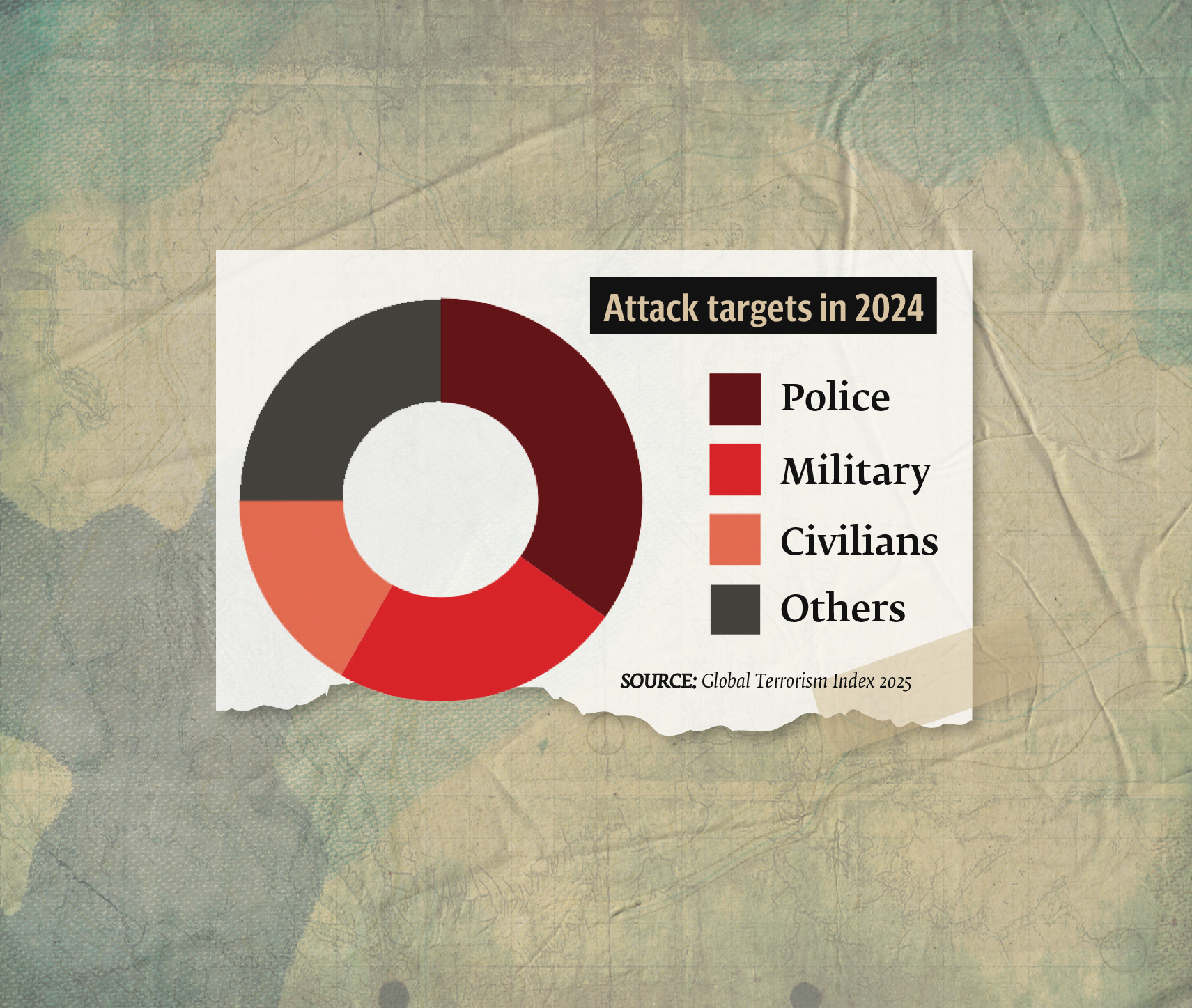
Taliban 1.0 vs Taliban 2.0
Analysts say no country has done more for Afghanistan than Pakistan, which has for decades hosted millions of refugees, facilitated trade, and supported post-war reconstruction efforts. After the Taliban takeover, Islamabad consistently advocated at the UN and other international forums for the unfreezing of Afghanistan’s $9 billion in assets to help its people. It has also used regional platforms, such as the Economic Cooperation Organisation, to push for humanitarian relief measures.
Despite these efforts, Afghanistan remains a source of terrorism, raising a crucial question: why does the Taliban regime remain hostile toward Pakistan?
Several factors may explain this. The Taliban appear keen to project Pashtun nationalist credentials by shedding Pakistani influence. Historic ties and ideological affinity with the TTP make it difficult for them to act against the group. The regime may also lack the capacity to confront these terrorists, while internal divisions within the Taliban —especially the Kandaharis vs Haqqanis tug of war — prevent a unified approach. Some within the regime may still view the TTP as strategic assets, or a bargaining chip, in future negotiations. Or, the Taliban may be trying to shift the conflict into Pakistan.
Some had hoped that Taliban 2.0 would have learnt from the past and adopt a more pragmatic, moderate, and inclusive approach to governance and global engagement. But Maj Gen (retd) Inam Ul Haque doesn’t see any difference between the Taliban 1.0 and 2.0. According to him, Kandahar, the Taliban’s ideological fountainhead, remains as dogmatic, inflexible, and uncompromising as ever.
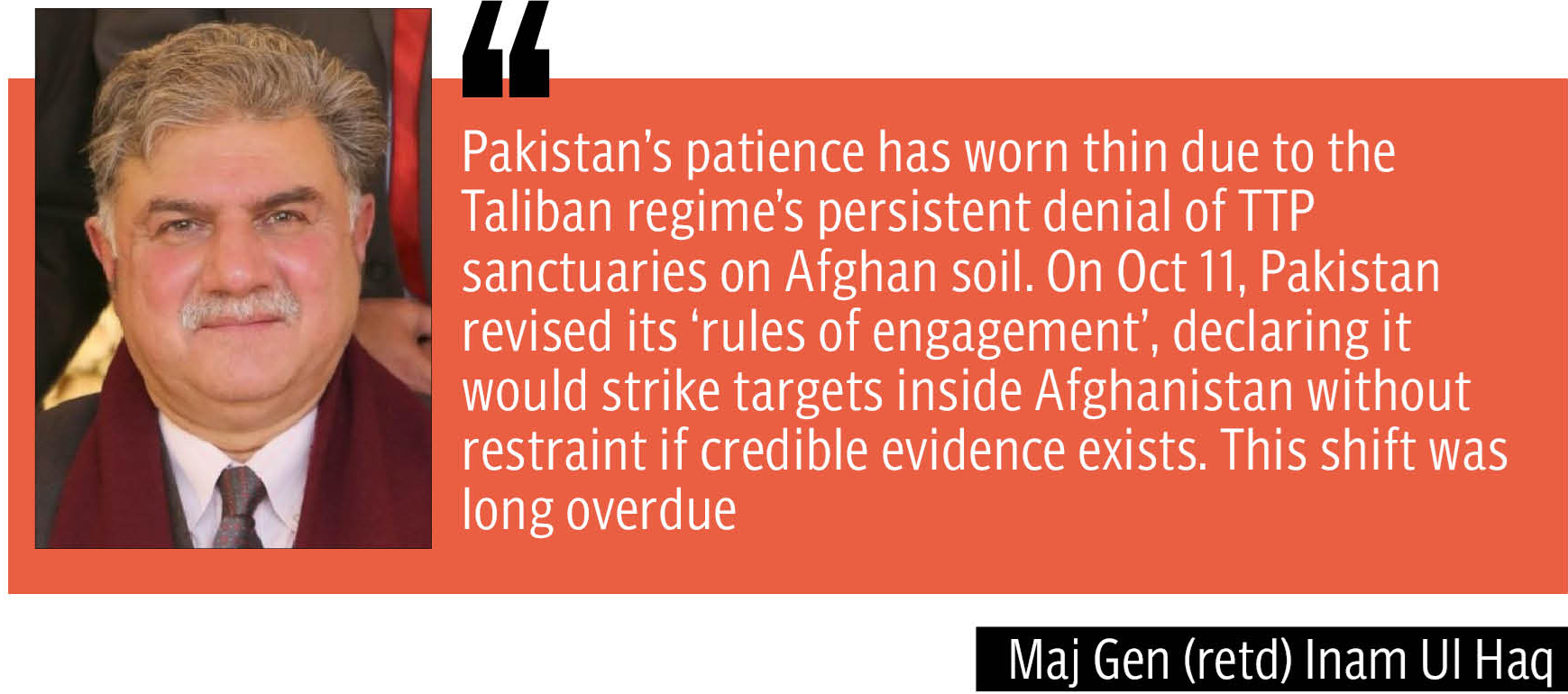
“Their worldview is shaped by a rigid mix of Islam and Pashtunwali, often defaulting to the latter when religious justification doesn’t align,” he says. “The current stance of the Kandahari faction can best be described as ‘Pashtun zid’ [logic-defying obduracy], which largely drives their refusal to act against transnational groups, including TTP/BLA, on Afghan soil.
Rules reset
After years of restraint, Pakistan has carried out limited kinetic actions, which, security and diplomatic analysts say, reflects a recalibration of the “rules of engagement” after political and diplomatic efforts failed to move the Taliban.
“Pakistan’s patience has worn thin due to the Taliban regime’s persistent denial of TTP sanctuaries on Afghan soil,” says Inam. “On Oct 11, Pakistan revised its ‘rules of engagement’, declaring it would strike targets inside Afghanistan without restraint if credible evidence exists. This shift was long overdue,” he adds.
“While border skirmishes with Afghanistan have occurred in the past too — from Bajaur in the 1960s to Angoor Adda in 2008 and Tari Mangal in 1987 — this latest flare-up is different. It is no longer a localised issue, but one directly linked to the policies and protection offered by the Taliban regime,” adds Inam, who has the firsthand experience of leading the fight against terrorists on the western frontier.
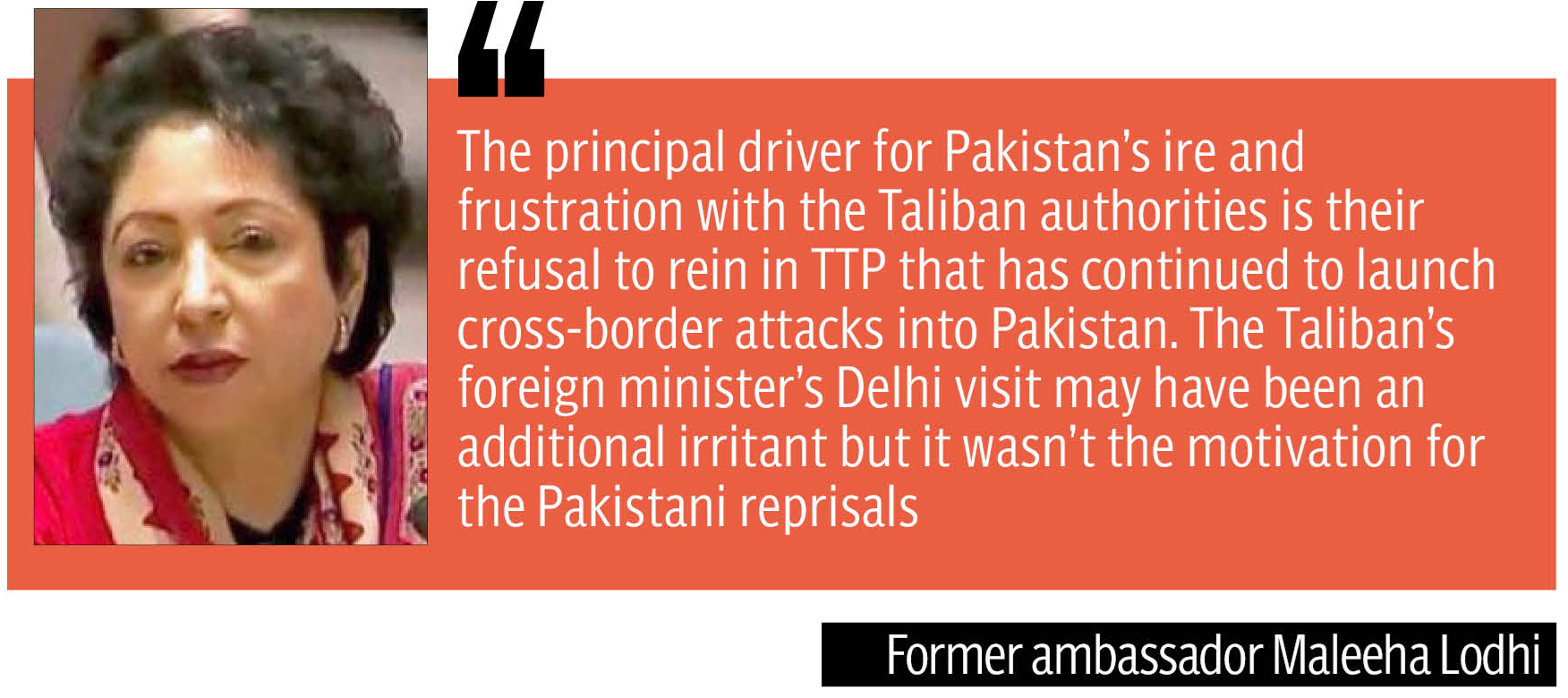
Former ambassador Maleeha Lodi echoes Inam’s view that Pakistan’s patience has run out. “The principal driver for Pakistan’s ire and frustration with Taliban authorities is their refusal to rein in TTP that has continued to launch cross-border attacks into Pakistan,” she says. “The Taliban’s foreign minister’s Delhi visit may have been an additional irritant but it wasn’t the motivation for the Pakistani reprisals.”
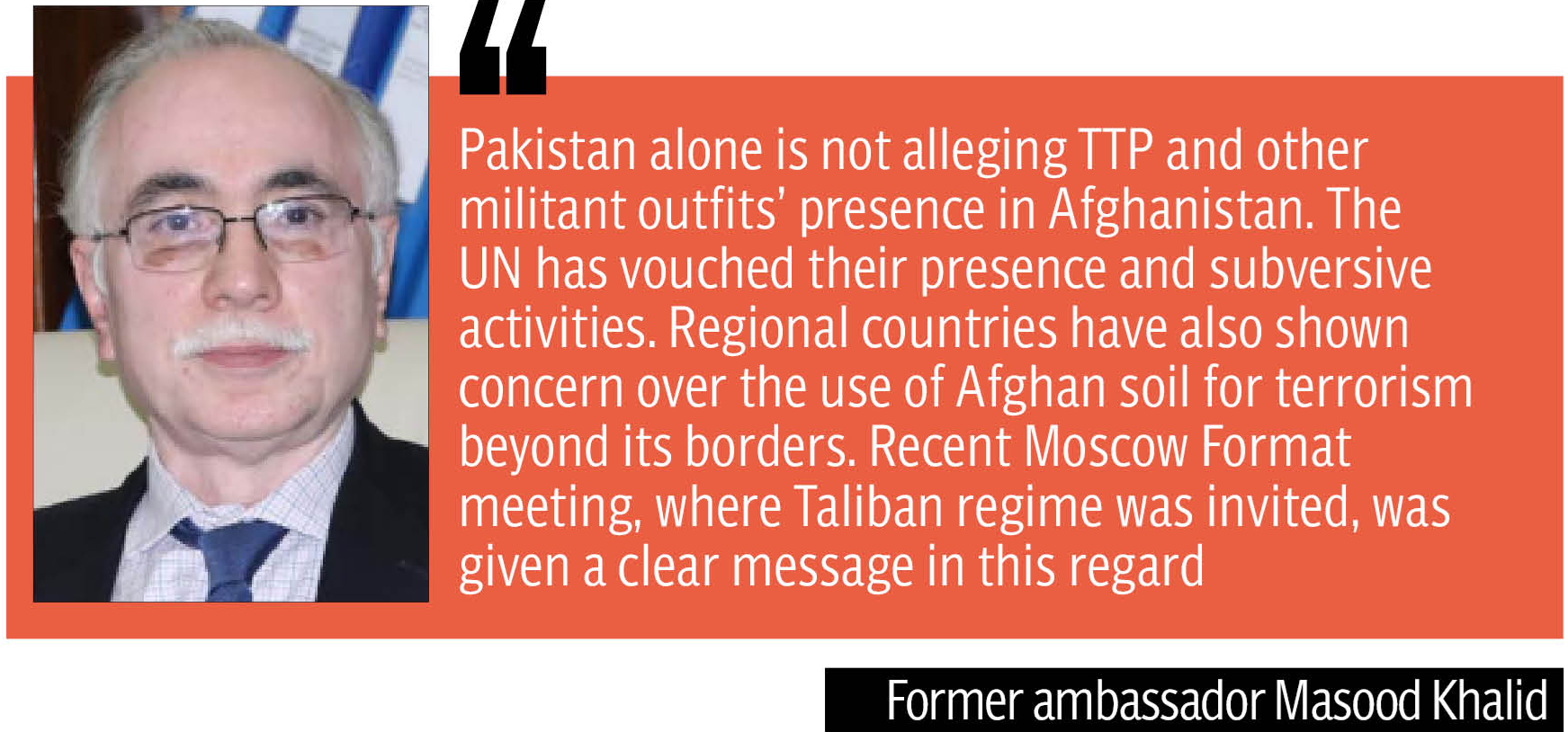
International law gives Pakistan the right to act in self-defence when its sovereignty or the security of its people is threatened by cross-border terrorist aggression. “Pakistan acted only when its urgings were not heeded and when its territory was attacked. Pakistan also made it clear that it has not targeted Afghan people but only terrorist centres being used against her,” says former ambassador Masood Khalid. “Pakistan has a right of self-defence under the UN Charter.”
After establishing deterrence through proportionate action, focus should now shift to diplomacy, argues former ambassador Mansoor Ahmad Khan. “In view of the sensitivity and strategic importance of our relations with Afghanistan, we should have drawn a wider agenda of dialogue with TTP/BLA terrorism to be taken up aggressively with Afghanistan,” says Khan, who has also served in Afghanistan.
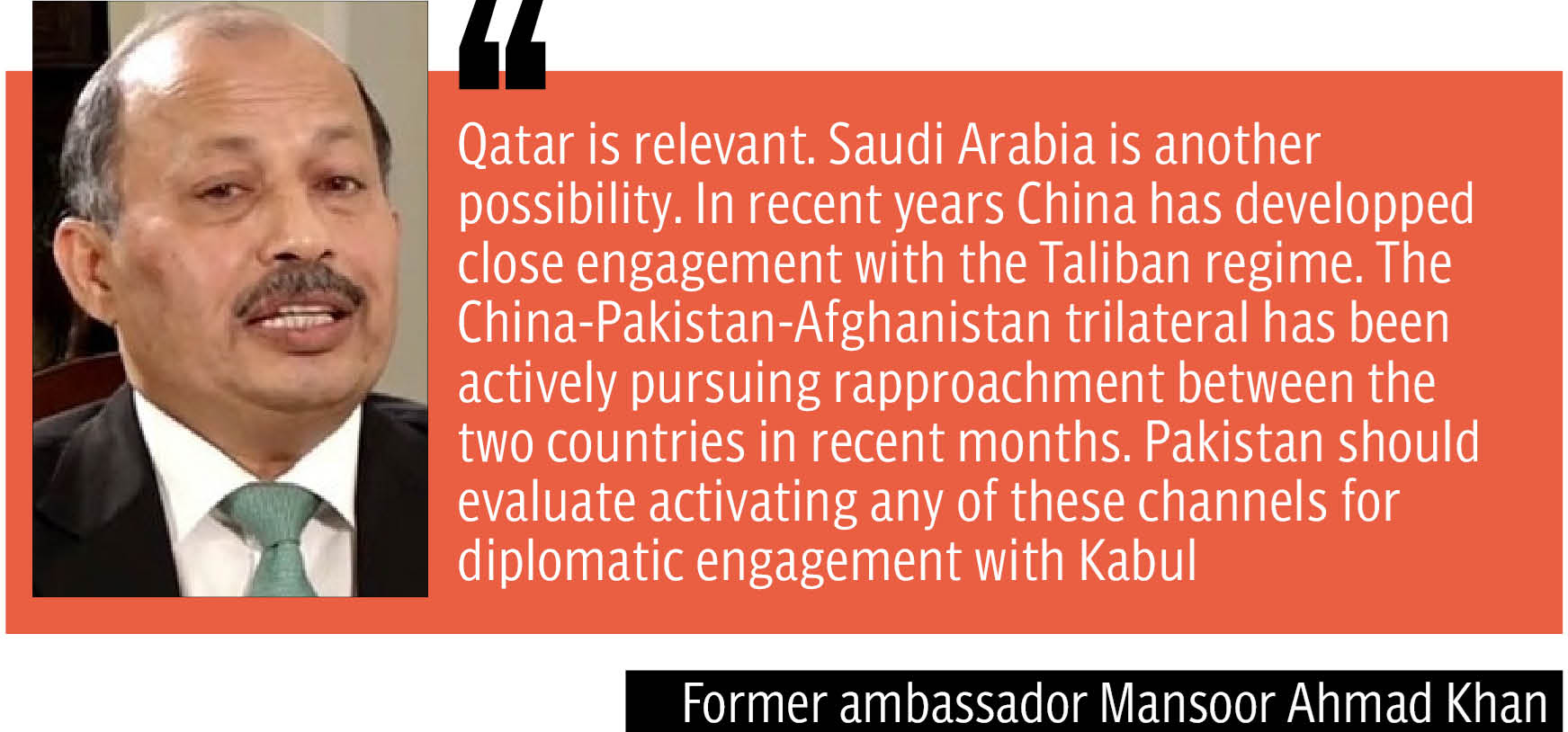
Former senator Mushahid Hussain Syed also advises “strategic restraint” after the kinetic action because he believes a “disproportional military response to a weaker enemy” has the danger of bringing the bigger country down a few notches. “Hence any military conflict is counterproductive for Pakistani interests, as we have more to lose politically and diplomatically given our vulnerability in K-P due to domestic political polarisation,” he says.
In any case, Afghanistan has long hung like an albatross around Pakistan’s neck, and getting embroiled in its quagmire could drag the country into an unwinnable, debilitating war of attrition. Moreover, Afghanistan distracts from Pakistan’s larger emerging regional role — a role made possible only after the country delinked from the Afghan quagmire and abandoned its misguided policy of “strategic depth.”
Foolish gimmick or message?
Islamabad claims that the TTP, BLA, and its Majeed Brigade serve as proxies backed by India under the “Doval Doctrine” — a hybrid warfare strategy attributed to Indian National Security Adviser Ajit Doval — designed to destabilise Pakistan. Against this backdrop, the Taliban’s outreach to India, including Foreign Minister Muttaqi’s visit to New Delhi and Deoband, has raised questions about whether this is a calculated message or a diplomatic misstep.
“Connecting the dots: three separate but related actions are quite clear as to Kabul regime’s intentions: the extraordinary protocol accorded by India to Mullah Muttaqi together with his eagerness to please his newfound Indian godfathers and his visit and speech at Deoband, then the openly-proclaimed Doval Doctrine of destabilising Pakistan, using a combination of ‘Money, Madrassah and Militancy’, and appointment of a certified Pakistan-hater as Afghanistan’s ambassador to India, are pointers to a strategic realignment between Kabul and Delhi to Pakistan’s detriment,” says Mushahid.
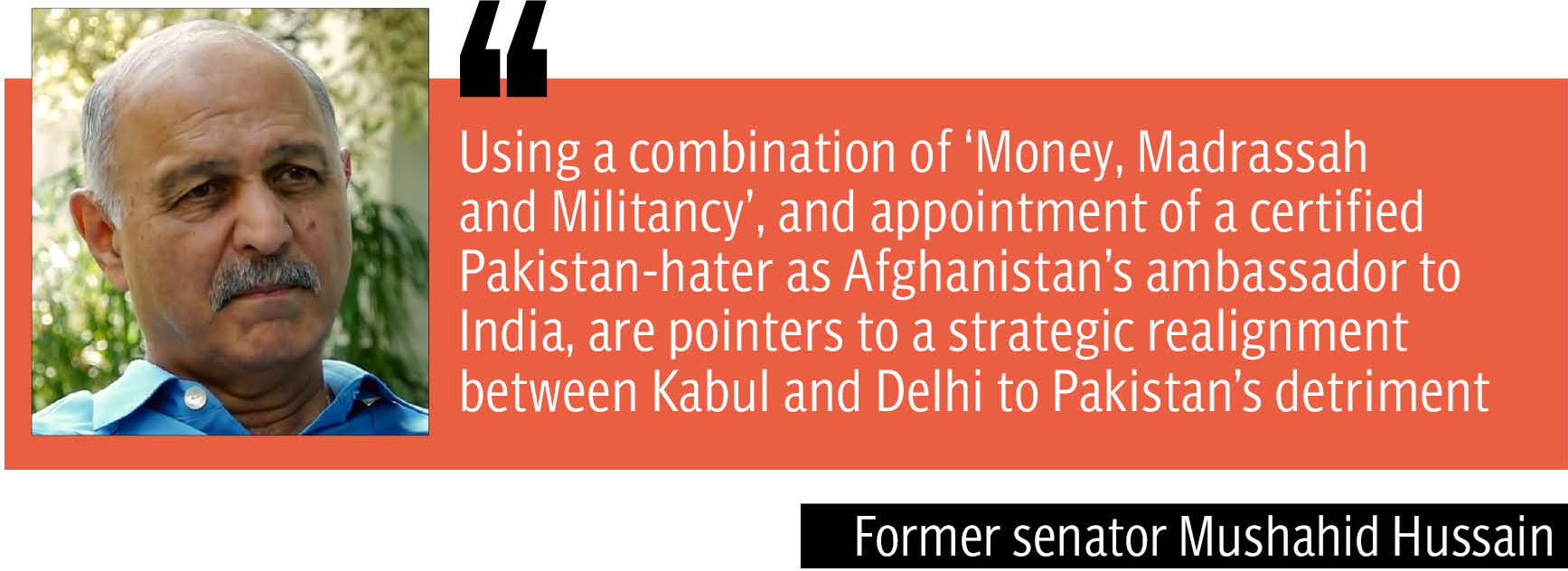 “Certainly, this emerging Indo-Afghan axis seems to be the preferred option of the dominant Kandahari ruling faction in the Taliban regime,” he adds.
“Certainly, this emerging Indo-Afghan axis seems to be the preferred option of the dominant Kandahari ruling faction in the Taliban regime,” he adds.
Khan says Afghanistan has always used India ties as a card in its dealing with Pakistan. “[However] the quantum of strategic space India gets in Afghanistan depends on its relations with Pakistan. If Pakistan-Afghanistan relations could be addressed effectively, Kabul has much higher natural inclination for linkages with Pakistan which, in turn, limits India’s space. Pakistan has to worry more about deteriorating relations with Afghanistan and less about its overtures towards India,” he adds.
Inam, however, views Muttaqi’s visit not as a calculated move, but as a misguided one, arguing that “it was not driven by a love for India, but aimed at provoking Pakistan.”
The Taliban’s overtures to India defy logic, especially considering the history between the two, says the retired general. “It was the same Modi regime that labeled them as terrorists not long ago and colluded with NATO forces occupying Afghanistan. Modi’s government was also involved in planning against the Taliban and managed US bases in Afghanistan.”
While the Taliban regime is free to establish diplomatic relations with any country, it should not engage with one that has been hostile to Pakistan, given Islamabad’s long-standing support, including hosting refugees and providing diplomatic and economic aid. “Pakistan deserves respect for its good neighbourliness,” he says, calling the Taliban’s approach to India a “foolish gimmick.”
Lodhi views the Taliban’s outreach to India through a different lens. “The forging of closer ties with New Delhi is a tactical response by the Taliban and for that reason not a source of anxiety for Islamabad,” she says. “The reality is that Pakistan has a border with Afghanistan, and not India. That makes landlocked Afghanistan needing Pakistan.”
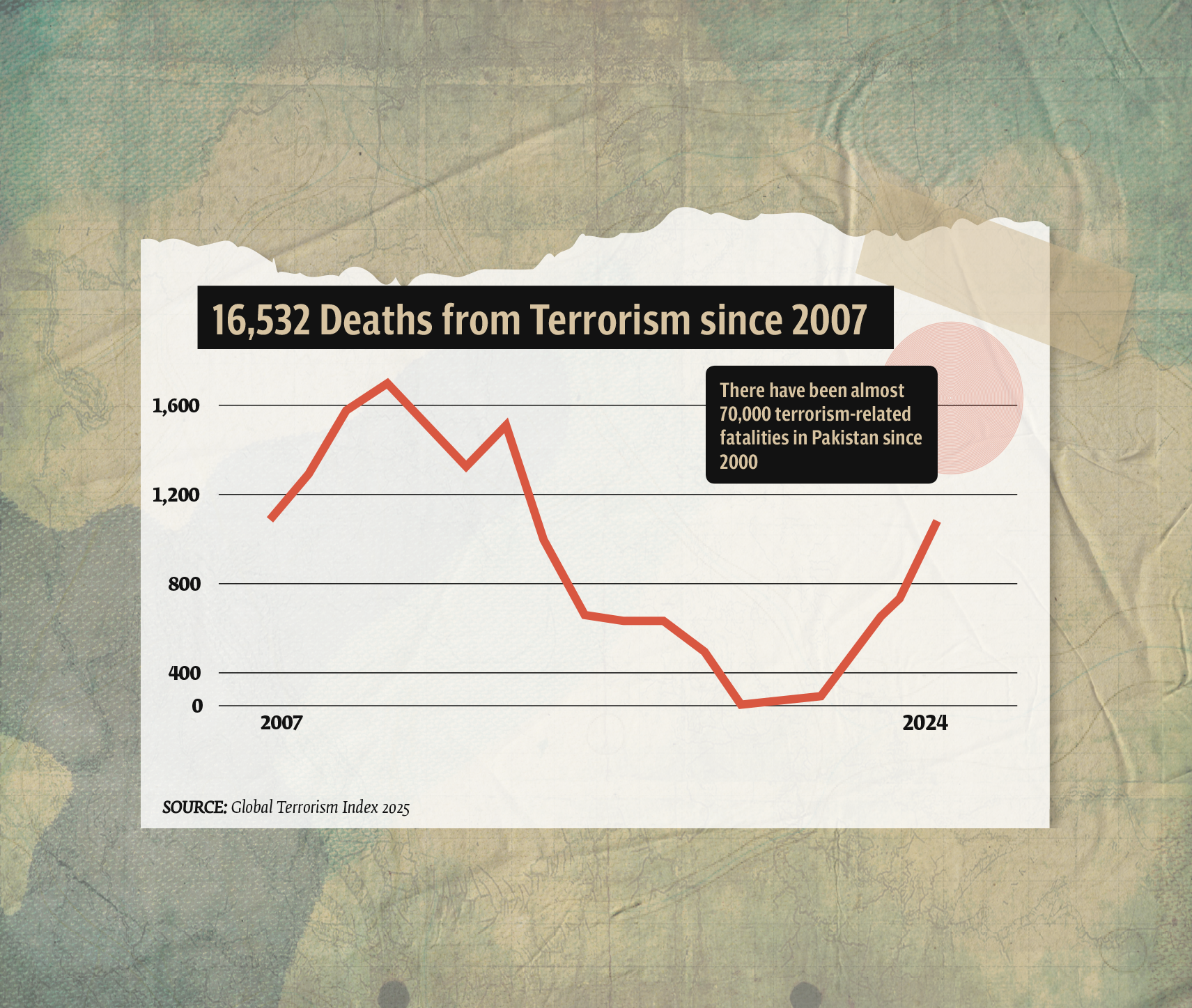
Talk of regime change
According to Inam, the international diplomatic community has largely given up on Afghanistan, viewing it as a “lost cause” due to issues like gender apartheid, human rights abuses, and the presence of terrorist groups like TTP, ISK-P, and al Qaeda. “There’s a growing shift in international thinking towards the need for regime change.”
But is that even possible in a country where the Taliban now face little challenge from the once-powerful warlords? “There could be three possible scenarios: 1) a resurrection of the Northern Alliance; 2) an implosion within the Taliban, driven by deep divisions between the puritanical Kandaharis and the more pragmatic Haqqanis; and 3) a repeat of 2001, with heavy aerial strikes and a northern offensive retaking Kabul,” he says. “This is a real possibility, if the Taliban regime doesn’t budge.”
Inam describes Pakistan as a “second home” for Afghans, but warns that if the Taliban regime continues to ignore Pakistan’s legitimate security concerns, Afghans will have nowhere to escape if “Daisy Cutters and MOABs start raining down on Afghanistan again,” referring to the heavy aerial bombings during the American-led occupation.
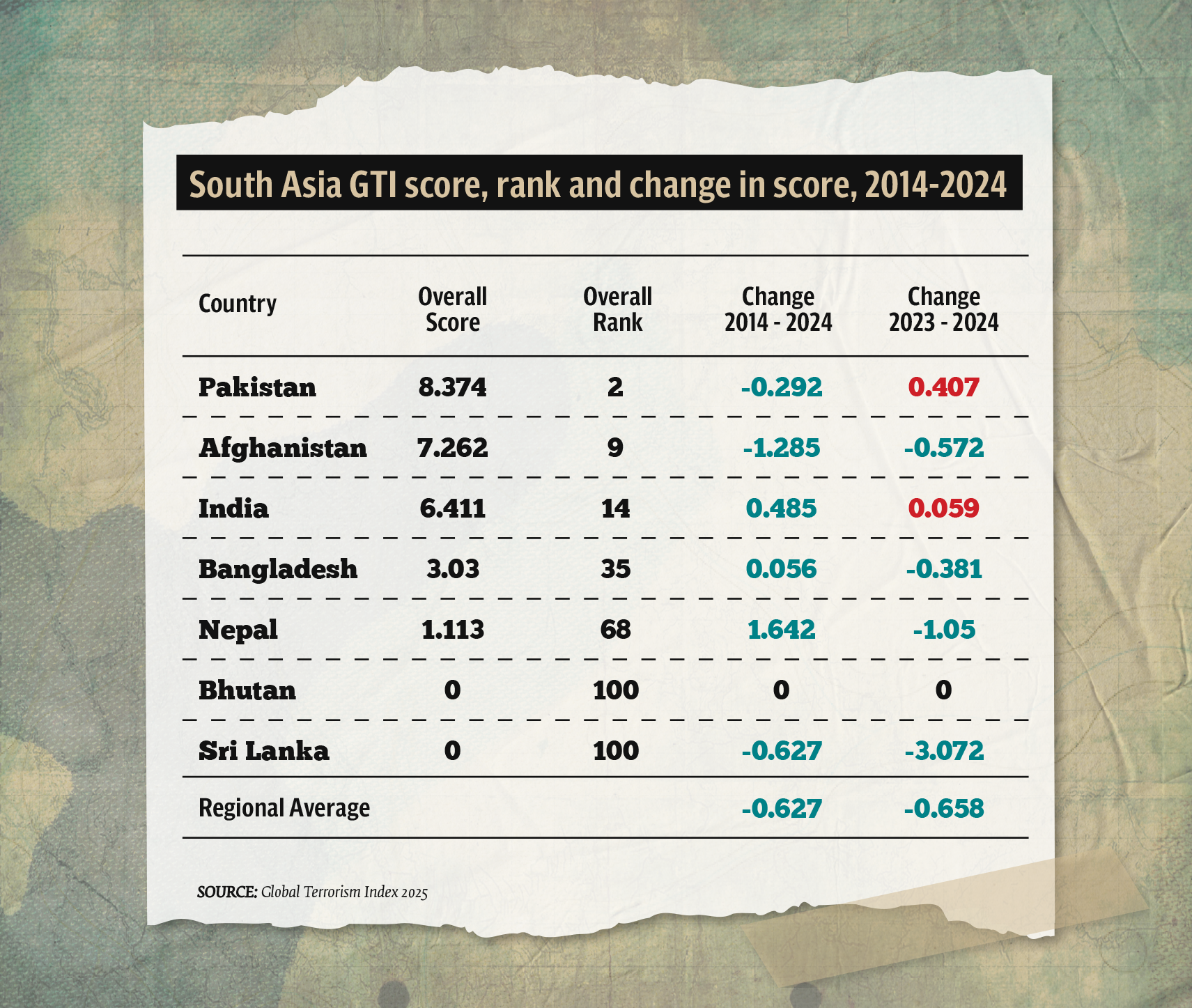
However, former diplomats warn that regime change would be a risky gamble, with repercussions for the entire region — and even beyond. “Talk of regime change is for now an expression of frustration with the Taliban authorities. But it is dangerous talk as any effort by neighbouring or other powers to seek to do this can sow chaos in Afghanistan and is also unlikely to succeed,” says Lodhi.
Khan also urges caution, citing the strategic importance of the Pak-Afghan relationship. “Regime change is the prerogative of the Afghan people — not any other country. Political structures and governance systems are Afghanistan’s internal matter. While these must align with principles of human rights and international law, Pakistan has consistently opposed interference in the internal affairs of other states,” he says.
Mushahid, however, argues that foreign intervention may not be necessary for regime change in Afghanistan. He points out that the rigid stance and puritanical ideology of the Kandahari faction could ultimately cause the Taliban regime to unravel from within.
“Zulfikar Ali Bhutto learnt from the Maoist dictum, ‘Talk, Talk, Fight, Fight’, while handling the Kabul regime in the 1970s, till the Kabul regime realised its mistake in taking an anti-Pakistan stance, but, by then, it was too late and the Kabul regime unraveled due to its own internal contradictions — a future likely to be the fate of the current Kabul dispensation as well, since their extremist policies, based on a combination of a medieval mindset and ideological ultra-conservatism, have already alienated the regime from the overwhelming majority of the people of Afghanistan,” Mushahid says.
DIPLOMACY AND DETERRENCE
The analysts recommend that Pakistan’s continued effort should remain on securing borders, internal stability and managing relations with the Afghan regime despite challenges. “The destinies of Pakistan and Afghanistan are interlinked,” says former ambassador Abdul Basit. “This reality should drive the two countries toward cooperation rather than confrontation. Kabul cannot — and must not — give short shrift to Pakistan’s concerns regarding the TTP. The Taliban must also understand that India will miss no opportunity to create problems between our two countries,” adds Basit, who has served as Pakistan’s top diplomat in New Delhi.
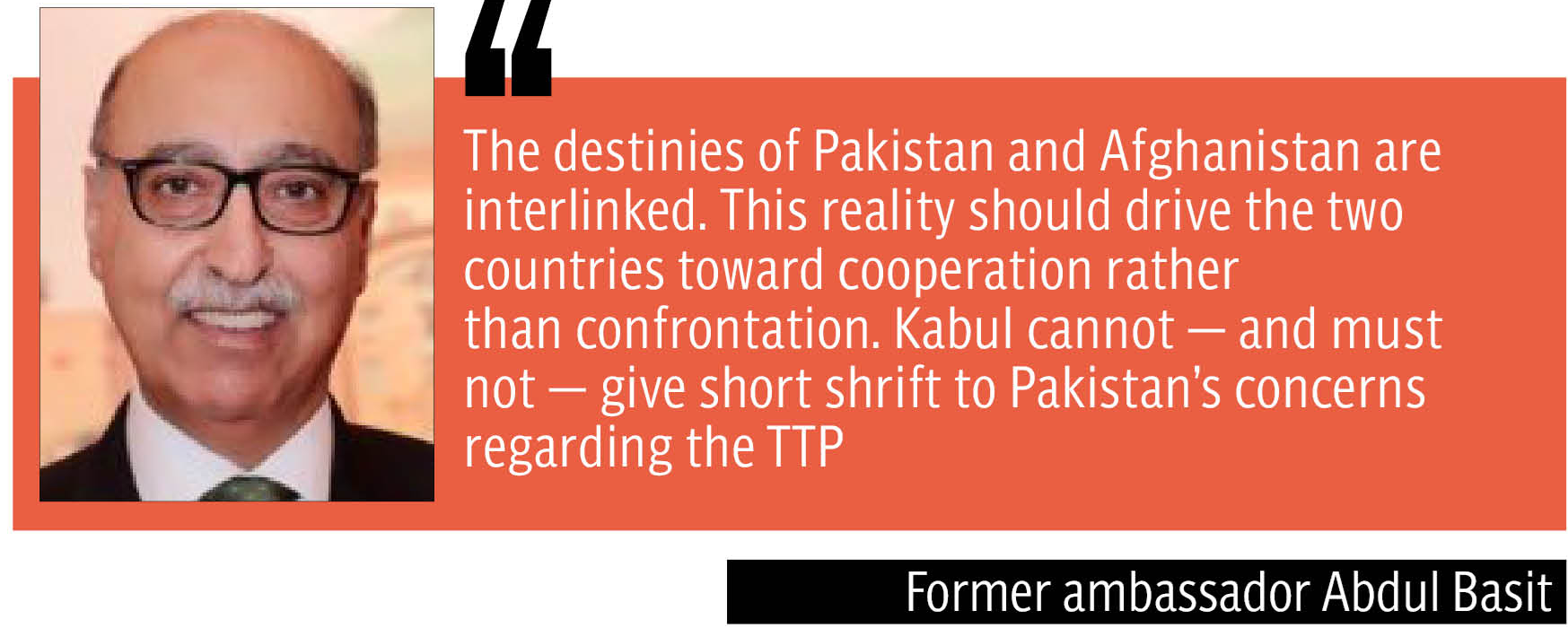
The former envoy urges the reopening of diplomatic channels and a reduction in hostile rhetoric.
“Two prime ministers may talk on the telephone and de-escalate. Border points must reopen immediately for trade and travel. We may encourage China to hold a trilateral meeting in Beijing at the earliest.”
According to Khalid, the onus is now on the Taliban to repair the fractured relationship. “A meaningful dialogue, resulting in firm assurances from Afghanistan as well as concrete action to curb TTP-related terrorism, could help ease tensions. A simple denial that no terrorism emanates from Afghan soil directed against Pakistan is contrary to the facts — and Pakistan will not accept it,” he adds.
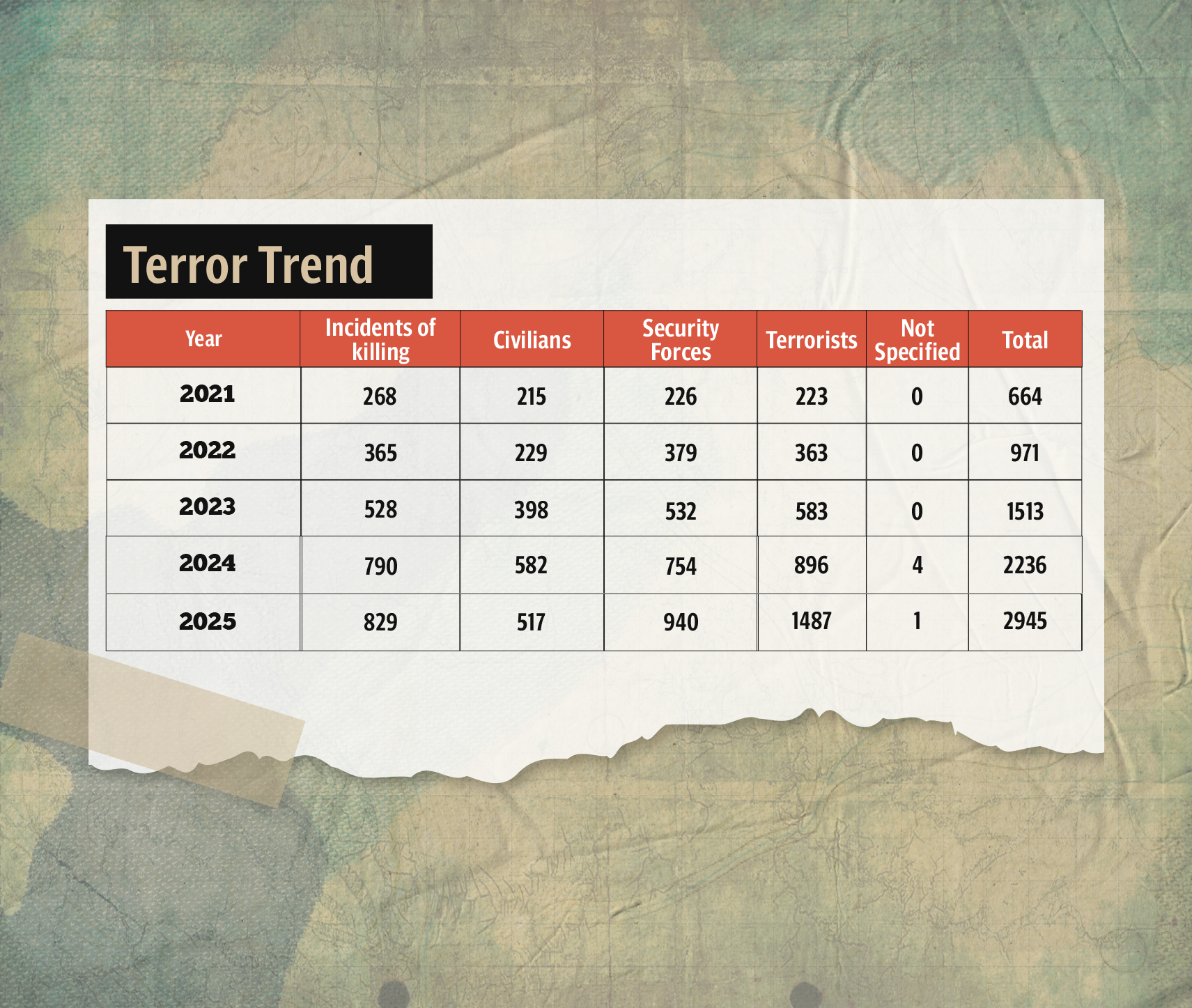
Neighbourhood approach
Lodhi agrees with Basit, saying that despite the heightened hostility, neither country can afford a complete breakdown in relations. “But because of the lack of trust, both seem to want mediators to help de-esclalate tensions. Gulf countries and China have influence with both countries to play a positive role. The return to diplomacy is important, sooner rather than later,” she says.
Mushahid, on his part, advocates neighbourhood diplomacy, saying that Pakistan should pursue “a proactive regional approach based on convergence of interests with all of the six neighbouring countries of Afghanistan, plus Russia and the USA.” Furthermore, he believes a more effective counterterrorism strategy and broad-based political consensus at home would pay more dividends in short term as well as in the long run, rather than a purely kinetic approach.
Neighbourhood diplomacy is particularly important because, according to Khalid, Pakistan is not alone in alleging the presence of TTP and other transnational groups in Afghanistan. The UN has confirmed their activities, and regional countries have also raised concerns about Afghan soil being used for cross-border terrorism. The recent Moscow Format meeting also sent a clear message to the Taliban regime on this issue.

Meanwhile, a high-level delegation — led by Defence Minister Khawaja Asif — is already in Doha, Qatar, for talks with the Taliban side, the Foreign Office confirmed on Saturday as an uneasy ceasefire holds between the two neighbours. “The talks will focus on immediate measures to end cross-border terrorism against Pakistan emanating from Afghanistan and restore peace and stability along the Pak-Afghan border,” it said.
Khan believes Qatar remains a relevant interlocutor, noting that the Doha Peace Agreement included a Taliban commitment to prevent the use of Afghan soil for terrorism. “Saudi Arabia is another viable option,” he adds, “as the Afghan Taliban have renewed their ties with the kingdom in recent years, while Pakistan has also entered into a strategic defence partnership with Riyadh.”
“China also remains an effective player in efforts toward Afghan peace and stability, having developed close engagement with the Taliban regime in recent years,” Khan adds. “The China-Pakistan-Afghanistan Trilateral Forum has been actively pursuing rapprochement between the two countries in recent months. Pakistan should consider activating any of these channels for diplomatic engagement with the Afghan interim government.”

The escalation along the western border presents a complex and volatile security environment shaped by the Taliban’s ambiguous stance on terrorism. While Pakistan has exercised restraint and pursued diplomatic avenues in the past, the persistent sanctuary provided to groups like TTP, BLA and HGB and the emerging Indo-Afghan axis pose challenges.
Experts agree that a purely kinetic approach is unsustainable. Pakistan must combine deterrence with proactive diplomacy, engaging partners such as China, Qatar, and Saudi Arabia to pressure Kabul toward tangible counterterrorism action. Ultimately, they say, Pakistan’s ability to secure its borders and maintain regional stability will depend on fostering dialogue, strengthening economic and people-to-people ties, and skillfully managing Afghanistan’s complex power dynamics — all while guarding against external influences that threaten its sovereignty and security.

